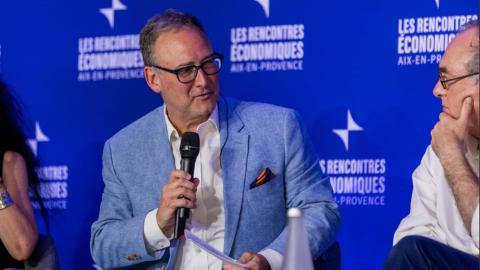Brigham McCown appears on a Les Rencontres Économiques d’Aix-en-Provence panel to discuss the energy vulnerability of several countries and its potential repercussions and his policy paper on the same subject. The full policy paper is below.
Securing Europe’s Future: France’s Pivotal Role in Energy Security
When it comes to energy, finding common ground across Europe and within the European Union’s institutions can sometimes be challenging. This difficulty can be explained as the need to simultaneously balance multiple priorities, including continuing economic growth while addressing environmental goals and finding ways to increase resilience against geopolitical instability. France, with its robust nuclear energy infrastructure and strategic vision, is uniquely positioned to lead the European Union toward a more durable and realistic energy mix against a backdrop of continuing global energy price volatility.
The Provence region, host to the Rencontres Économiques in Aix-en-Provence, plays a pivotal role, with its nearby Fos-sur-Mer LNG terminal strengthening Europe’s supply networks. While the energy transition is underway, it is crucial to temper this enthusiasm with some amount of realism. Creating a sustainable energy framework is important, but ensuring the energy mix remains stable and secure is equally important. Without this balance, well-intended policies may inadvertently undermine, rather than enhance, energy security.
Energy security entails “the uninterrupted availability of energy sources at an affordable price.”1 Energy abundance drives economic prosperity, whereas scarcity precipitates insecurity.2 France’s pivotal pragmatic approach offers a blueprint for stability within Europe.
France’s Energy Foundation: Nuclear Power and Beyond
France’s energy mix is secured by its unrivaled commitment to nuclear power, which supplies 70% of its electricity, the highest share among all countries worldwide.3 With 56 reactors, France generates approximately 400 terawatt-hours annually, meeting its domestic demand and exporting 60 terawatt-hours to neighboring countries such as Germany, Belgium, and Spain.4 Given high electricity prices throughout parts of Europe in 2025, Électricité de France (EDF) reported that electricity exports from France helped alleviate shortages during peak demand, solidifying France’s role as a cornerstone of Europe’s grid.5 While renewables accounted for 20% of France’s electricity in 2024, they remain hampered by intermittency.6 Nuclear power, on the other hand, has continued to ensure economic competitiveness while protecting consumers from disruptions. As Jean-Bernard Lévy aptly noted, “Nuclear is France’s backbone, delivering low-carbon stability in an uncertain world.”7
Traditional Energy as a Strategic Complement
In addition to nuclear power, natural gas remains a valuable bridge fuel on the path toward decarbonization. Pairing nicely with other energy fuels, especially renewables, natural gas will remain a bridge fuel for decades to come.8 Natural gas serves as a supplement to France’s nuclear dominance and enhances its energy security. In 2024, France imported 99% of its natural gas, mitigating risks through diversified sourcing with LNG from the United States (20%), Qatar, and Norway playing a significant role.9 The Fos-sur-Mer LNG terminal, strategically located near Aix-en-Provence, proved instrumental during the 2022 energy crisis. By expanding capacity, Fos-sur-Mer stabilized supplies, maintaining household energy costs 30% below the EU average in 2023.10 Provence’s nearby infrastructure is indicative of this strategic significance.
Diversification of energy sources, as noted by energy scholar Pierre Noël, “positions France as a model for pragmatic energy policy.”11 Unlike Germany’s pre-2022 dependence on Russian gas for half of its supply, France’s balanced approach to its energy mix protects industry and consumers alike.12
Environmental and Infrastructure Challenges
France’s energy strategy faces environmental scrutiny over nuclear waste and natural gas emissions. However, even so, these concerns are addressable. Renewables, contributing 20% of electricity, are limited by intermittency, as evidenced in 2023 when low wind speeds necessitated gas reliance for 10% of power.13 The 2022 energy crisis, with gas prices soaring 250% due to Russian supply cuts, underscored the risks of premature fossil fuel phase-outs.14 Infrastructure challenges persist as nearly thirty percent of France’s reactors are over forty years old, requiring €50 billion in upgrades by the end of the decade.15 Cybersecurity threats, such as the 2021 attack on a French grid operator, necessitate additional investments.16 In short, successfully navigating these challenges is imperative for France’s ongoing leadership.
France’s Leadership in Guiding Europe
France’s energy model serves as a roadmap for EU members, particularly Germany, which experienced significant price spikes and shortages following the 2022 period due to its reliance on Russian gas. Germany’s 2023 nuclear phase-out led to a 15% increase in coal use, which in turn elevated emissions and costs and triggered deindustrialization as firms relocated.17 France’s diversified portfolio offers a counterpoint. At the 2024 EU Energy Council, France proposed a “Clean Energy Compact,” advocating for low-carbon baseload power, which gained support from Poland and Sweden.18 France also assists smaller nations like the Czech Republic with nuclear safety and grid integration, fostering EU-wide resilience.19
The EU Commission must adopt a “prism of realism,” as Dieter Helm advocates, prioritizing reliable and affordable energy over idealistic renewable energy targets.20 France’s success with Fos-sur-Mer and nuclear exports exemplifies this pragmatism, a lesson to avert the vulnerabilities of 2022. By integrating EU grids and supply chains, France reduces reliance on external powers.
Strategic Pathways for a Secure Future
- France’s leadership is based on modernizing infrastructure, advancing technology, and promoting global cooperation. Key pathways include:
- Nuclear Modernization: Investing €50 billion to sustain 70% of low-carbon electricity through 2050, including small modular reactors (SMRs). EDF’s Nuward SMR pilot could supply 10% of power by 2040.21
- LNG Expansion: Enhancing Fos-sur-Mer to handle 30% more imports by 2027, securing diverse supplies.22
- Renewable Integration: Upgrading grids to manage variable solar and wind, with Provence’s microgrids and Aix-Marseille University’s storage innovations as a potential testbed.23
- Cybersecurity: Implementing EU-wide protocols, per ENISA (2023), to safeguard grids.24
- Global Cooperation for Decarbonization: Decarbonization demands universal commitment, yet global CO2 emissions reached 37.4 billion tons in 2024, with China (31%) and India (7%) as leading contributors.25
A note of explanation regarding this last recommendation: Since the 2015 Paris Agreement, global coal capacity has increased by 259 GW, with 44.1 GW commissioned and 25.2 GW retired in 2024 alone, primarily driven by China and India.26 Last year, worldwide coal usage hit a record 8.77 billion tons as new coal capacity outpaced retirements.
China, while investing in renewables, increased coal capacity by 5% in 2024, prioritizing energy security and economic growth.27 India and the Global South face developmental imperatives, constraining rapid fossil fuel phase-outs. France must spearhead a pragmatic global dialogue, advocating for tangible emissions reductions over symbolic pledges. A phased transition, extending to 2050, balances climate goals with industrial competitiveness, preventing outsourcing to high-emission regions. The EU’s carbon pricing reform (ETS) can incentivize reductions while safeguarding industries, offering a model for global adoption.28 By fostering international partnerships, such as the Just Energy Transition Partnership, France can support emerging economies in aligning economic growth with decarbonization.29
Conclusion: A Call to Lead Europe’s Energy Future
France is uniquely positioned to help shape Europe’s energy security in a way that is progressive yet tempered with realism. While our energy mix will naturally evolve, energy security requires the proper balancing of the three key components of energy security. This can be achieved by advancing policies that modernize nuclear power with advanced generation reactors, expand LNG capacity, and pioneer clean technologies while driving EU-wide collaboration. By fostering dialogue among policymakers, industry leaders, and academics, events like this forum can help ensure access to reliable and affordable energy. France’s pragmatic approach offers a blueprint for a resilient, sustainable, and secure Europe.
Brigham McCown is a senior fellow and director of the Initiative on American Energy Security at Hudson Institute and teaches law and public policy at Miami University. A former federal regulator, corporate executive, and naval aviator, he has advised U.S. federal ministers and serves on multiple boards.















